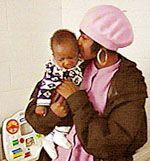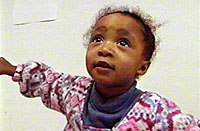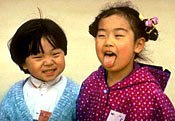Is abortion justifiable when the child is unwanted? Doesn't unwantedness lead to child abuse?


It is argued by many people in the pro-choice movement that legal abortion helps eliminate unwanted children. They believe that unwanted children are indirectly responsible for a great number of family problems, such as child abuse. Hence, if a family can have the “correct” amount of children at the “proper” times, then these family problems will be greatly reduced, if not eliminated.[1]
Once again, we find several serious problems with the pro-choice argument.
First, the argument begs the question, because only by assuming that the unborn are not fully human does this argument work. For if the unborn are fully human, like the abused young children which we readily admit are fully human, then to execute the unborn is most severe child abuse.
It is very difficult to demonstrate that the moral and metaphysical value of a human being is dependent on whether someone wants or cares for that human being. For example, no one disputes that the homeless have value even though they are for the most part unwanted. Now, suppose the pro-choice advocate responds to this by saying, “But you are treating the unborn as if they were as human as the homeless.” This is exactly my point. The question is not whether the unborn are wanted; the question is whether the unborn are fully human.
-
 Daughter of a teenage mother. From the video series "Whatever Happened to America?"
Daughter of a teenage mother. From the video series "Whatever Happened to America?"An unwanted child almost never turns out to be a resented baby. This seems to be borne out statistically:
(a) There is no solid evidence that a child's being unwanted during pregnancy produces child abuse.
(b) According to one study, 90% of battered children were wanted pregnancies.[2]
(c) Some writers have argued that there is a higher frequency of abuse among adopted children—who were undoubtedly wanted by their adoptee parents—than among those who are unadopted.[3]
In his voluminous and scholarly study on the moral, political, and constitutional aspects of the abortion issue, Professor Krason summarizes his findings concerning the argument from unwantedness by pointing out that “the factors causing child abuse cited most frequently by the researches are not ‘unwantedness,’ but parents' lack of social support from family, friends and community, hostility to them by society, based on a disapproved sexual and social pattern of existence, and—most commonly—their having been abused and neglected themselves when they were children.” [4]
 The unwantedness of children in general tells us a great deal about our psychological and moral make-up as a people, but very little about the value of the child involved. For it is only a self-centered, hedonistic people who do not consider it their self-evident obligation to care for the most vulnerable and defenseless members of the human race. A lack of caring is a flaw in the one who ought to care, not in the person who ought to be cared for. Hence, whether or not abortion is morally justified depends on whether the unborn are fully human, not on their wantedness.
The unwantedness of children in general tells us a great deal about our psychological and moral make-up as a people, but very little about the value of the child involved. For it is only a self-centered, hedonistic people who do not consider it their self-evident obligation to care for the most vulnerable and defenseless members of the human race. A lack of caring is a flaw in the one who ought to care, not in the person who ought to be cared for. Hence, whether or not abortion is morally justified depends on whether the unborn are fully human, not on their wantedness.
References
- See the arguments in the Planned Parenthood Federation of America brief (for Roe v. Wade), as cited in Stephen M. Krason, Abortion: Politics, Morality, and the Constitution(Lanham, MD: University Press of America, 1984), pp. 315-319. [up]
- E. F. Lenoski, M.D., “Translating Injury Data into Preventative Health Care Services,” University of Southern California Medical School, unpublished, 1976, as cited in Krason, Abortion, p. 320. [up]
- See B. D. Schmitt and C. H. Kempe, Child Abuse: Management and Prevention of the Battered Child Syndrome (Basle: Ciba-Geigy, 1975). [up]
- Krason, p. 320. See Rosemary S. Hunter, M.D., et. al., "Antecedents of Child Abuse and Neglect in Premature Infants: A Prospective Study in a Newborn Intensive Care Unit," in Pediatrics 61 (1978), pp. 629, 634; Vincent J. Fontana, M.D., and Douglas J. Besharov, The Maltreated Child, 4th ed. (Springfield, IL: Charles C. Thomas, 1979), pp. 12-13, 27; Richard Gelles, "A Profile of Violence Toward Children in the United States," in Child Abuse: An Agenda for Action, editors, George Gebner, Catherine J. Ross, and Edward Ziegler (New York: Oxford University Press, 1980), pp. 102-103. [up]
Author: Francis J. Beckwith Adapted from a series in Christian Research Journal, Spring 1991. Provided with permission by Summit Ministries and the author.
Copyright © 1995, 1998, Christian Research Institute, 1991, 1998, All Rights Reserved—except as noted on attached “Usage and Copyright” page that grants ChristianAnswers.Net users generous rights for putting this page to work in their homes, personal witnessing, churches and schools.
For further reading on abortion issues
- Francis J. Beckwith, Politically Correct Death: Answering the Arguments for Abortion Rights (Grand Rapids, Michigan: Baker Book House, 1993).
- Francis J. Beckwith, Abortion and the Sanctity of Human Life (Joplin, Missouri: College Press, 2000).
- Stephen Schwarz, The Moral Question of Abortion (Loyola University Press, 1990).
- Randy Alcorn, Prolife Answers to Prochoice Arguments (Sisters, Oregon: Multnomah Press, 2000).
